Managing the waste of more than 200 million people is no joke, Nigeria produces an impressive 42 million tons of waste each year and that has had an impact on human health and the environment. Nigerian journalists Oke Peter and Damilola Shittu unravel how the defective waste disposal system and water pollution endanger Nigerian lives.
Ever since the dawn of human civilization, waste is a problem, and the garbage dump is the oldest and most common form of waste processing. Garbage is left in a heap or thrown in pits. In 1960, Nigeria’s population was about 45 million, waste processing did not pose a serious problem. But the waste problem has continued to grow along with the uncontrolled Nigerian population — which today stands at about 206 million people.
Managing the waste of more than 200 million people is not easy. Nigeria is urbanized and industrialized and the consumption pattern of her people has changed. These factors have escalated the solid waste management problems. In the cities, waste is collected quickly, thanks to the waste bins provided by the government. But it is also common to see city dwellers to put their waste in the sewers dump when it rains. There are also densely populated areas where the waste is not picked up. This is where the residents do approach cart pushers to collect their waste and destroy it in the wrong way. And in the countryside, waste is usually collected and burned in the open. So there are waste heaps in public places, but most Nigerians seem not to be bothered by this due to a lack of good information about the health risks of such practices.
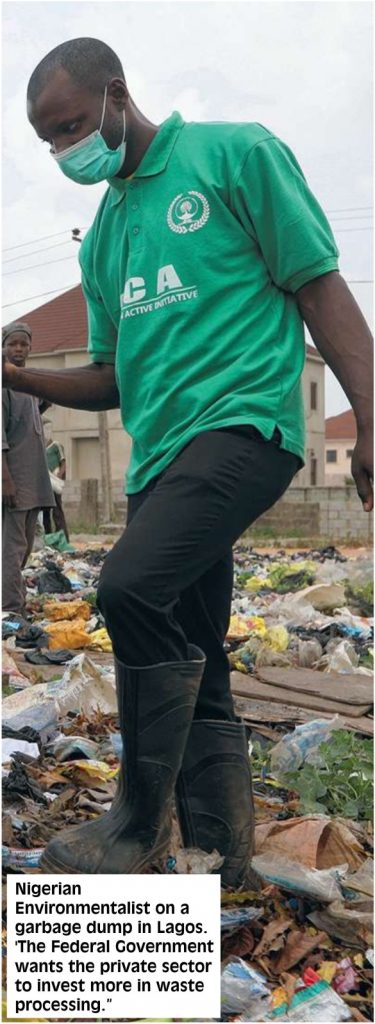
Poor waste management poses a threat to well-being and health, and then, especially from the people who live near the garbage dumps. Open garbage dumps are a source of microbial and toxic chemical soil contamination. They can also contaminate wells, cause serious health risks, and destroys biodiversity.
42 million tons of waste
Of the 37 Nigerian states, according to research, only Abuja, Lagos, Rivers, and Ogun had a good statewide waste management plan in the capitals. As a result, residents ignorantly burn waste in the open. Most states appear to have little interest in developing the waste sector.
Nigeria generates on average 42 million tons of waste. That’s more than half of the 62 million tons of waste that sub-Saharan Africa produced. In Lagos State, with more than 21 million inhabitants, the most populous state in the country, 0.5 kg of waste per person is produced per day. The city of Lagos produces about 13,000 tons of city waste every day, which is the highest waste rate in Africa. In Lagos exists the famous Olusosun garbage dump, the largest in Africa and one of the largest in the World?
At the Olusosun garbage dump, more than 2,000 workers search through the waste. They become exposed to harmful waste from the processing industry. A garbage comber on the site, Kuchika James, when asked when he started working on the site, said: “I’ve been here for five years looking through the garbage.” He lives and sleeps here also. “Some businessmen care about our money sort through the garbage for them. They took our finds and sell to certain manufacturing companies. This job is tough with no fixed wage.”
Whether James doesn’t think it’s dangerous to go through the waste without a mouth mask or gloves? “It’s okay. We smell no smell here. You see people eating, drinking, and doing other things. God is our protector.”

In March 2018, a wildfire broke out at the Olusosun garbage dump, where goods and several vehicles were damaged. The authorities stated that the cause of the fire could not be determined, but according to experts, chemical reactions to the dumpsite caused the fire. We look around the area of the garbage dump and find that the water is polluted and not suitable for drinking. Kunmi Adegboye, a landlord in the neighborhood confirms: “We don’t drink our water here because it stinks. The stench that comes out of our wells is unbearable. We buy drinking water every day.”
Garbage collection
According to a top official of the Lagos Waste Management Authority (LAWMA) who prefers anonymity, “Our waste management mechanism is to change of mentality and implementation of modern ways of waste management in Lagos State. We are determined to make sure every nook and cranny of Lagos continues to get attention from our employees because a cleaner and healthier environment is better for everyone.”
The agency, in collaboration with Lagos State Government, has adopted the Private Sector Participation (PSP) approach to waste collection. The scheme allows PSP operators and individuals who own Refuse Compactor Trucks to move from house to house to evacuate waste and subsequently dump it at the designated garbage dumps. Residents pay tokens for this service and it has been effective and reduced all forms of indiscriminate dumping of waste on roads, canals, markets, and other unauthorized locations, which poses a lot of hazards to the environment and residents.
“We have intensified efforts at riding roads in the state of filth, with reinvigorated highway sanitation scheme, where street sweepers are engaged to clean major roads and public places such as bus stops, garages, and schools, among others,” he concluded.

A visit to garbage dumps in several Nigerian cities revealed the facilities are not well managed. The Oyo State Government-owned Ajakanga garbage dump, situated along Asunle Road in Ibadan had no access road. According to an inscription at the entrance, the facility is currently under renovation. Because the population grew, homes were built around the garbage dump. If the state doesn’t act soon to relocate the garbage dump, it may threaten a possible epidemic.
The municipal garbage dump at Onitsha, Anambra State in the South-Eastern part of Nigeria is the dirtiest. There are no basic amenities or access roads. There is no working recycling park on-site.
Also, the condition of the Eligbolo-Eliozu garbage dump in Port Harcourt, Rivers State capital, has been in serious decline recently. The garbage dump is managed by the Rivers Agency for State Waste Management (RIMAWA) and is a potential source of pollution. In Kano, in the North-Western part of the country, according to reports, the existing garbage dump in the place is known for pollution by heavy metals, which can cause diseases similar to Parkinson’s, muscular dystrophy, and Alzheimer’s.
No landfill in Nigeria
According to environmental expert, Mr. Marcus Innocent, there is no well-organized landfill in Nigeria. He describes a landfill as a technical design, constructed with ground cover and pipes, where waste is taken to and buried under the ground. During that process, the gases that are released are discharged and measures are taken to prevent the waste from contaminating groundwater. “Currently there is no landfill in Nigeria,” says Innocent.
Due to the lack of well-designed landfills run by the government, open garbage dumps are scattered all over the country. A landfill is the cheapest, healthier, and most acceptable method to get rid of solid waste in cities and municipalities. Also, advanced waste recycling facilities are lacking in Nigeria.
War on filth
The fight against waste and anti-social behaviour in Nigeria has been going on for several decades. In March 1984, the military government led by former Major-General Muhammadu Buhari announced the establishment of the ‘War Against Indiscipline (WAI)’. Among the phases of WAI is the War Against Filth. The scheme, aimed at cleaning private and public environments includes a monthly environmental sanitation programme designed to clear refuse and illegal structures in public places and homes across the country.
However, WAI implementation lasted for a while and was gradually discontinued after a military coup that removed Major-General Buhari.
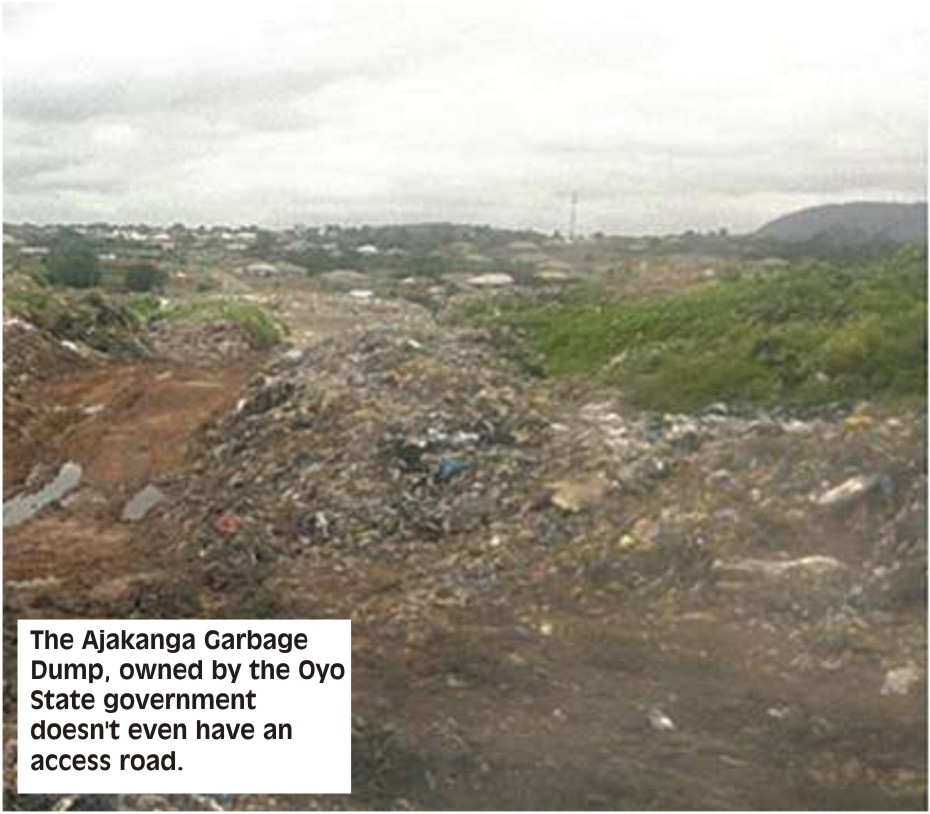
Later, health experts started warning citizens of the consequences of incorrect waste handling and lack of enforcement of rules. Due to climate change, there are more and heavier downpours, and they have often led to flooding and erosion. With every rain shower, household waste ends up in the ocean.
Waste management suffers from political interference and a lack of synergy between successive governments.
A source who prefers anonymity at the Environmental Health and Pollution Control Unit at the Federal Ministry of Environment, Maitama, Abuja, Nigeria, disclosed that waste management falls within the control of the local governments. “The Federal Government has set up a large number of programmes for a cleaner and healthier environment, thereby belonging to the Integrated Waste Management Facility to which the private sector is invited to invest in waste collection and recycling.
The Nigerian Government put a starting amount of 250 million naira (about 570,000 Euros). The state governments must also support grants, and local authorities should provide land in their communities for the project. But the state governments, unfortunately, politicized the project are they did not cooperate.”
“What the government wants to introduce now is the management of solid waste by local communities, whereby communities are encouraged and empowered to manage their waste. We’ve already done this in five states of Nasarawa, Kogi, Kwara, Anambra, and Adamawa we would do more,” he said.
In 2009, the Federal Government donated plastic recycling plants to 26 states, to eradicate the problem of plastic waste. But the factories are today in different stages of decay because they have never been used.
The Government also provided incinerators for several Federal Medical centers and big hospitals in Ibadan, Abeokuta, Lagos, and Owo, because hospital waste is delicate to end up in garbage dump. But the hospitals have never put them to use.
In Mpape, Abuja the Federal Ministry of Environment in collaboration with the Abuja Environmental Protection Board (AEPB) built a Waste Recovery Facility Plant where wastes are sorted and categorized. ‘Not all waste has to go to the garbage dump,” says the source. “Plastic, metal, paper, nylon, and other raw materials can be recycled. Only biodegradable waste has to go to the garbage dump.
Recently the Environmental Protection Council issued a facility where you can trade waste for money. Students, workers, and individuals collect household waste and get paid for it. That turned out to be very helpful.”
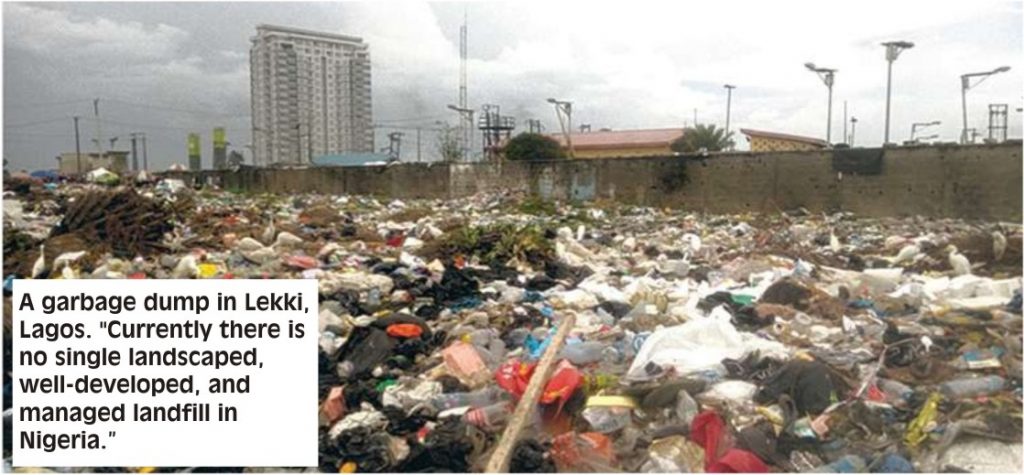
Public health
According to World Population Review, Nigeria is the 10th most polluted country in the world. Water pollution has harmful effects on people and the environment. Also, air pollution by burning fossil fuels causes problems for public health, such as respiratory problems, asthma, and even abnormalities at birth. Pollution from toxic substances is worldwide one of the main risk factors for non-communicable diseases, according to the Global Burden of Disease Study 2015 by the US Institute of Health Metrics and Evaluation. Non-communicable diseases are responsible, according to the same study for 72 percent of all deaths, of which 16 percent are caused by toxic contamination. Toxic pollution is responsible for 22 percent of all cardiovascular diseases, 25 percent of the deaths from stroke, 40 percent of lung cancer deaths, and 53 percent of deaths from chronic obstructive lung diseases.
The quality of drinking water plays an important role: according to the World Health Organisation (WHO), 80 percent of diseases are transmitted through water. In several countries, it meets drinking water not up to WHO standards studies have also shown that approximately 3.1 percent of deaths worldwide can be attributed to polluted water.
Water pollution is a major problem in Nigeria. The reasons for this, according to research, include regulatory lock jam, political instability, unsustainable policies, inadequate orientation, lack of funding, lack of quality drainage system, incessant flooding, inadequate emergency capacity, poor town planning and layout, environmental degradation, and erosion, among others, are negatively contributing to water pollution in Nigeria. In most communities, sanitation and sewage systems are poorly managed. Many people don’t care how they get rid of their waste.
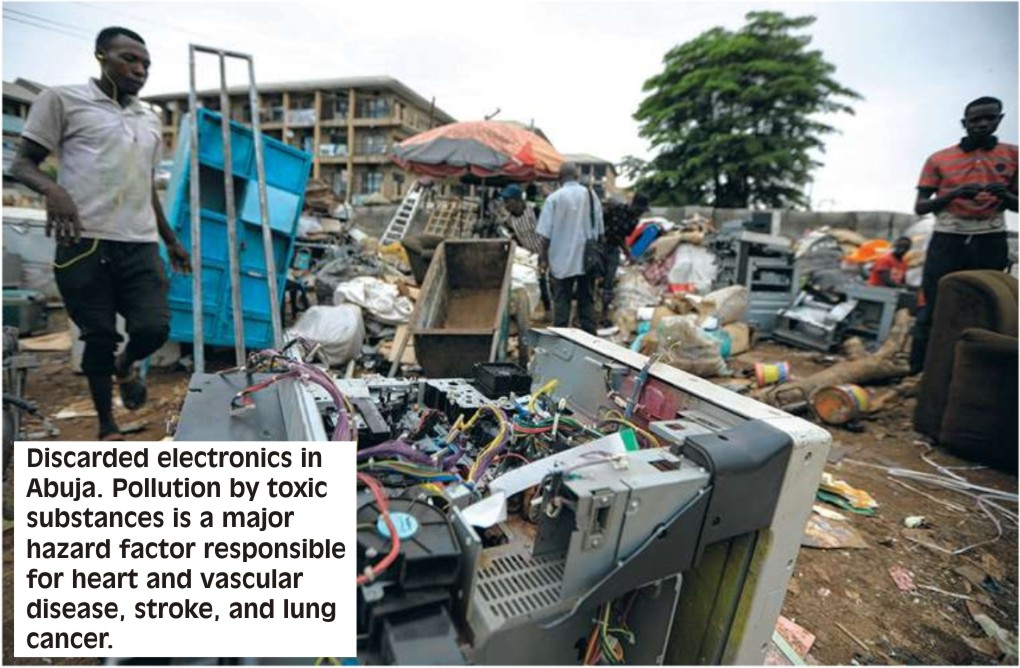
A visit to beaches in Nigeria reveals heaps of waste on the banks. They pollute the water and prevent a free flow. Soil and groundwater also become polluted because certain factories and citizens dispose of waste and chemicals that later end up in the ocean. It’s not healthy.
Commenting on the threats of water pollution to human health, the Senior Registrar, Family Medicine, Eko Hospital, Ikeja, Lagos, Dr. Segun Adeniran said: “Polluted water intake will have a damaging consequence on any living organism. Diseases like typhoid fever, cholera, hepatitis, and some skin, and kidney problems are spreading through polluted water.
Disruption in food chains happens when toxins and pollutants in the water are consumed by aquatic animals (fish), which are then consumed by humans. That is why these diseases are prevalent in Nigeria.” As the damage from pollution has become apparent, more countries are looking to green alternatives to prevent further damage to the earth. Solar and wind energy, eco-friendly building materials, and non-toxic products are increasingly being used to help preserve the planet. While these green initiatives are taking place around the world, some countries have a long way to go.
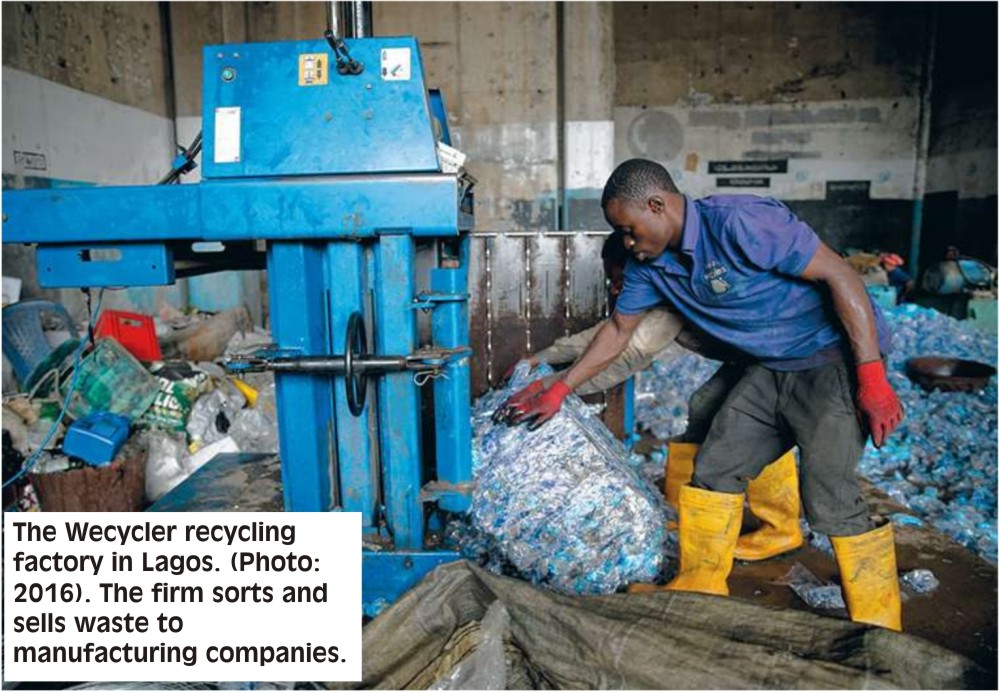
Climate change poses challenges to the Nigerian economy and government. This makes the consequences of the existing water pollution and unsorted waste processing only get bigger and creates new risks for people and the environment. There is an urgent need in Nigeria for a regulatory framework of the government that should be attractive for the private sector to invest in waste management, and ensure that water sources are protected against pollution. Citizens raising awareness about the importance of a good water supply for health is certainly part of that. The Nigerian government also needs to figure out a way to monitor and ensure that money spent on environmental projects is judiciously spent and accounted for. This mechanism is necessary to prevent corrupt practices and discourage political interference in contracts, and adopt sustainable policies encourage.
This research was made possible with support from the Pascal Decroos Fund for Investigative journalism.
*Oke Peter is a journalist in Ibadan, Nigeria. He is writing on energy, climate change and the environment.
*Damilola Shittu is a senior energy reporter specialized in (renewable) energy.







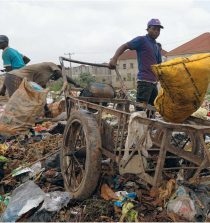

Thanks for sharing. I read many of your blog posts, cool, your blog is very good.
Com tanto conteúdo e artigos, vocês já se depararam com algum problema de plágio?
také jsem si vás poznamenal, abych se podíval na nové věci na vašem blogu.|Hej! Vadilo by vám, kdybych sdílel váš blog s mým facebookem.
|Hello to all, for the reason that I am actually keen of
devido a esta maravilhosa leitura!!! O que é que eu acho?
at web, except I know I am getting familiarity all the time by reading thes pleasant posts.|Fantastic post. I will also be handling some of these problems.|Hello, I think this is a great blog. I happened onto it;) I have bookmarked it and will check it out again. The best way to change is via wealth and independence. May you prosper and never stop mentoring others.|I was overjoyed to find this website. I must express my gratitude for your time because this was an amazing read! I thoroughly enjoyed reading it, and I’ve bookmarked your blog so I can check out fresh content in the future.|Hi there! If I shared your blog with my Facebook group, would that be okay? I believe there are a lot of people who would truly value your article.|منشور رائع. سأتعامل مع بعض هذه|
nenarazili jste někdy na problémy s plagorismem nebo porušováním autorských práv? Moje webové stránky mají spoustu unikátního obsahu, který jsem vytvořil.
Hey there! I know this is kinda off topic but I was wondering which blog platform are you using for this site? I’m getting tired of WordPress because I’ve had problems with hackers and I’m looking at alternatives for another platform. I would be fantastic if you could point me in the direction of a good platform.
) Znovu ho navštívím, protože jsem si ho poznamenal. Peníze a svoboda je nejlepší způsob, jak se změnit, ať jste bohatí a
díky tomuto nádhernému čtení! Rozhodně se mi líbil každý kousek z toho a já
Very nice post. I just stumbled upon your weblog and wanted to say that I have really enjoyed surfing around your blog posts. In any case I’ll be subscribing to your rss feed and I hope you write again soon!
buď vytvořil sám, nebo zadal externí firmě, ale vypadá to.
Excellent post. I was checking continuously this blog and I’m impressed! Very useful information specifically the last part 🙂 I care for such info a lot. I was looking for this particular information for a long time. Thank you and best of luck.
Děkuji|Ahoj všem, obsah, který je na této stránce k dispozici.
Their worldwide outreach programs are commendable.
can you buy cheap lisinopril without a prescription
Their global pharmacists’ network is commendable.
Their pet medication section is comprehensive.
can you buy cheap cytotec pill
Drug information.
Actual trends of drug.
gabapentin leg swelling
Their wellness workshops have been super beneficial.
I appreciate the range of payment options they offer.
where buy cytotec without insurance
Their global network ensures the best medication prices.
I will right away grasp your rss feed as I can not in finding your e-mail subscription hyperlink or e-newsletter service. Do you’ve any? Kindly allow me recognise in order that I could subscribe. Thanks.
Pioneers in the realm of global pharmacy.
where to get cheap lisinopril pills
Always providing clarity and peace of mind.